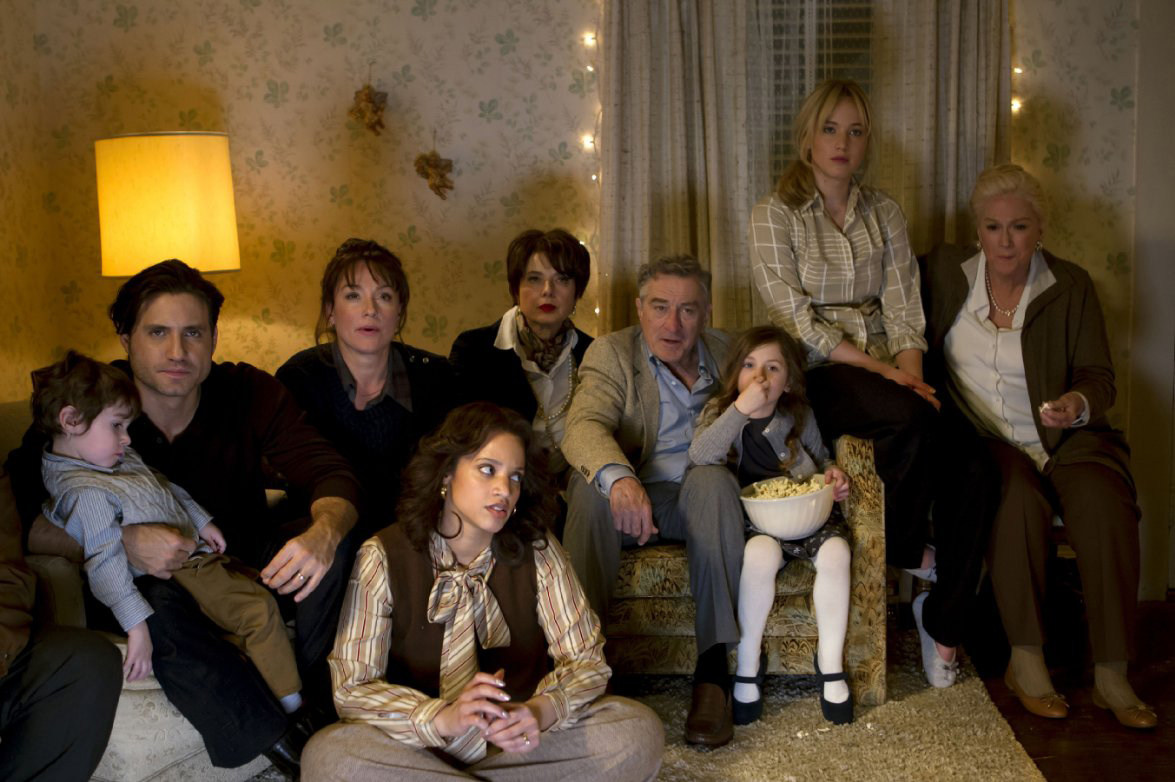Jennifer Lawrence Deserves Better Than ‘Joy’
David O. Russell leans too hard on his favorite actress in the story of a plucky inventor.

David O. Russell’s Joy is a homemade holiday card to scrappy moms who overcame the odds in order to provide for their family, made by a spatially-challenged 7-year-old who ran out of room and had to squeeze in the last letters of his message.
Jennifer Lawrence plays a character loosely based on Joy Magano, the single mother who invented the self-wringing Miracle Mop and went on to make a fortune with her company Ingenious Designs. But while Joy may be a biographical story, don’t call it a biopic. When we did in an October story about Joy, a 20th Century Fox rep contacted us for a correction: After Russell took over the project from Annie Mumolo (Bridesmaids), he redeveloped Lawrence’s character as a composite of several female entrepreneurs. Or so goes the company line.
But Magano’s mop is always at the center of the story, from the first sketches drawn with her daughter’s colored pencils, to a life-changing demonstration at QVC headquarters, to Joy’s discovery that a vendor has stolen her design. The QVC scenes are some of the movie’s most engaging: Here we meet Bradley Cooper’s Neil Walker, an executive at the home shopping network who takes a passionate interest in Joy’s product despite a weak initial pitch, and then nearly ruins her in a quick succession of precipitous choices. His enthusiasm for his business is impressive, but his scenes of over-the-top self-seriousness about home shopping act as a distracting reminder to the viewer that she is watching a melodrama about a plastic mop — albeit one with 300 feet of cotton on a continuous loop.

Russell seems to have envisioned Joy as a semi-modern, semi-ironic Cinderella story: There’s a whole lot of housework, an ugly-hearted half sister, a pivotal scene involving glass, and a modest approximation of Prince Charming in Cooper. Still, though she gets some support along the way, it’s Joy who must ultimately rescue herself.
For the most part, the talented Lawrence shines like a freshly-mopped kitchen floor in her portrayal of a put-upon young mother who is counted on to care for three generations of family and a deadbeat ex-husband. Rather than turn her back on her ungrateful dependents, Joy dives headlong into the role of even-headed caretaker and turns to her father (Robert DeNiro) for a long-overdue favor after he becomes involved with a wealthy widow (Isabella Rosselini). Lawrence effectively conveys the buried frustration and despair of a woman who simply cannot afford to fall apart, and who will ferociously squeeze even the sourest of lemons for something like lemonade.
But Russell’s insistence on miscasting Lawrence in age-inappropriate roles is not only a weakness of the movie itself; his blind faith in his muse du jour has exposed Lawrence’s limits, through no fault of the 25-year-old actor. Academy Awards aside, Russell has always needed Lawrence more than Lawrence needs Russell, but Silver Linings Playbook and American Hustle both had more to offer than a pleasing ingenue. In Joy, Russell overburdens his muse (much like Joy’s family does), counting on her to save a film with an almost-trivial premise, an uneven script, and comically illogical pacing. The movie could have easily ended with a triumphant scene of Joy toppling a rival, but Russell added a flash-forward coda of Joy as a middle-aged, absurdly costumed tycoon with an unfamiliar, unsettling affect that suits neither the character or the actor.
In the middle of Joy, Lawrence is outfitted in a ridiculous suit and gaudy accessories for her first TV appearance. Telling her boss she’s just going to make one minor change, Joy emerges from the dressing room in her own clothes, looking much like she did when she arrived to the studio. “This is me,” she says, “I’m going to go on as me.” It makes you wish that Lawrence had insisted on the same with her director.
Joy will be released in theaters on December 25th.
